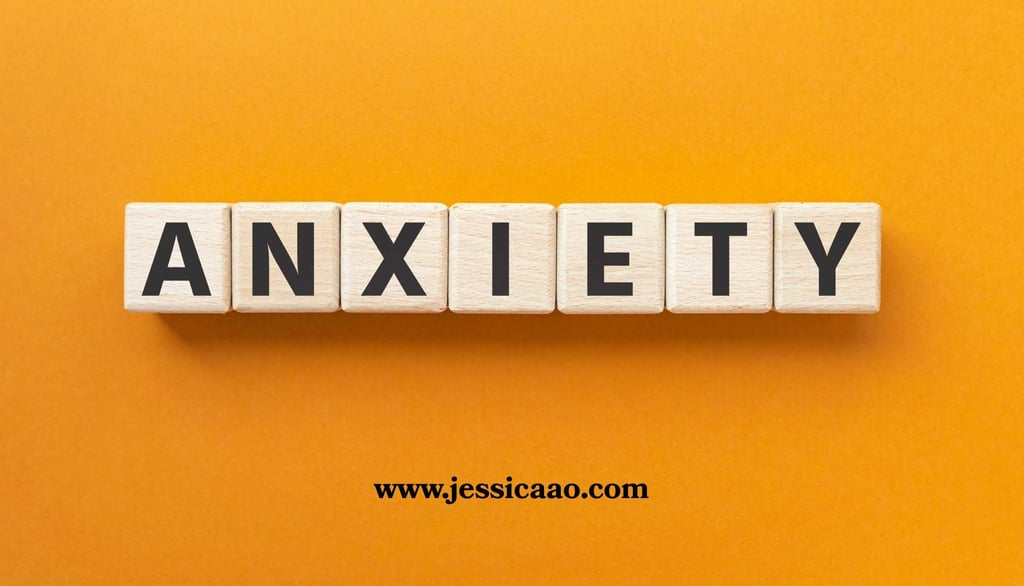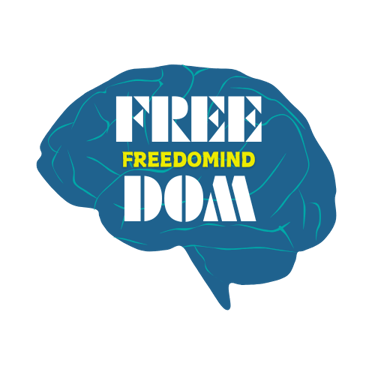How to Ease Anxiety by Rewiring Your Brain and Habits: A Practical Guide
Discover practical, science-backed strategies to relieve anxiety by rewiring your brain and building healthy habits. Learn how to calm your mind, regain control, and create lasting emotional balance.
MENTAL HEALTH
Jessica Ao | Hypnotherapist & Nutrition Coach
6/10/20255 min read


These days, anxiety feels like an invisible weight that sneaks into our thoughts, our decisions, even our breathing. For some people, it shows up as chest tightness, stomach issues, a racing heart, or sweaty palms. For others, it's more subtle—they might not even realize they’re anxious, just that they’re constantly on edge or overwhelmed.
So what is anxiety really? Why does it hit us the way it does? And more importantly—what can we do about it?
This isn’t just a quick-fix post. I want to walk you through what’s actually happening inside your brain when you’re anxious, and how you can gently but powerfully shift your response over time. Not by forcing your way out of it, but by retraining your brain and building habits that bring real calm.
What Anxiety Actually Is
Anxiety isn’t just in your head—it's your brain’s way of trying to protect you. When your brain thinks something might be a threat (even if it isn’t), it flips into fight-or-flight mode. The part of your brain called the amygdala sounds the alarm, and suddenly your body is flooded with stress hormones like cortisol.
The tricky part? Your brain doesn’t always know the difference between a real threat and a perceived one. That email you’ve been avoiding? Your brain might treat it like a lion hiding in the bushes. And just like that—you’re in full-blown anxiety mode.
The truth is, your anxiety often comes from how you interpret things. Your definition of a situation can shape your entire nervous system’s response. That’s why two people can experience the same event and react totally differently.
Common Triggers (And How They're Defined by You)
Anxiety isn’t one-size-fits-all. Some common triggers include:
External pressure – Deadlines, money worries, or responsibilities can feel crushing if we define them as “more than I can handle.”
Internal pressure – Perfectionism or low self-worth can make failure feel like a personal collapse.
Lifestyle habits – Lack of sleep, too much caffeine, alcohol, or even just overstimulation can quietly build into anxiety.
Misinterpreted events – Like assuming someone’s short text means they’re upset with you, or that one awkward moment ruined everything.
At its core, anxiety is a learned pattern in the brain. But here’s the good news: that pattern can be unlearned.
What Anxiety Does to Your Brain
Every time you feel anxious, that same “danger circuit” gets stronger—like a walking path turning into a highway. This is because cortisol helps your brain remember stressful events more vividly, which only reinforces the loop.
Over time, anxiety can mess with your focus, memory, digestion, sleep, and relationships. You might start avoiding situations, second-guessing yourself constantly, or just feeling exhausted from living in survival mode.
But your brain has this incredible gift called neuroplasticity. It means your wiring isn’t fixed. You can change these loops. You can create new ones.
How to Shift Out of Anxiety
Here are a few science-backed (and soul-aligned) ways to break the cycle:
1. Mindfulness & Meditation
Even just 10 minutes a day of intentional breathing or body awareness can reduce anxiety. It calms the amygdala and activates the parts of your brain that help regulate emotion.
Try this:
Box breathing: Breathe in for 4 seconds, hold for 4, out for 4, hold for 4. Repeat. It signals safety to your nervous system.
Body scan: Bring awareness to each part of your body. It helps pull you out of your mind and into the present moment.
2. Cognitive Reframing
This comes from CBT (Cognitive Behavioral Therapy), and it’s a powerful way to challenge anxious thoughts. When something triggers you, ask:
“Is this really that serious?”
“What facts actually support this fear?”
“If my best friend felt this way, what would I say to them?”
These questions help your brain step back and see things more clearly. Over time, this rewires the way your brain reacts to stress.
3. One-on-One Support
Sometimes, what we need isn’t just tips, it’s someone who really gets your patterns, your story. Personalized guidance helps uncover the deeper roots of anxiety and gives you tools that actually match your brain and life. Hypnotherapy, for example, is a gentle way to work with the subconscious patterns driving your anxiety—without reliving trauma.
Long-Term Habits That Build Emotional Resilience
You're not just a brain. You're a whole person—body, mind, and spirit. So here are a few more pillars to help anchor your calm:
Movement
Exercise boosts BDNF (a growth hormone in the brain) and strengthens areas involved in mood and memory. Even a 30-minute walk outside a few times a week can make a huge difference.
Sleep
Lack of sleep makes your brain more reactive. Protect your rest by keeping a regular schedule, turning off screens at least an hour before bed, and cutting back on caffeine and alcohol.
Nutrition
Your brain needs stable blood sugar and the right nutrients to function well. A mostly plant-based diet, rich in greens, fruit, whole grains, and omega-3s, can help support emotional balance.
Connection
Feeling supported and heard changes your brain chemistry. Talk to a friend. Join a support group. Let someone in. Healing isn’t meant to be done alone.
Final Thought
Anxiety is common—but it’s not permanent. With patience, compassion, and a bit of brain-smart strategy, you can reclaim the calm that’s already within you.
The more you understand your own mind, the more power you have to change it.
And if you want more practical tools for emotional healing and nervous system balance, keep exploring with us. You’re not alone—and real peace is absolutely possible.
Ready to Take the First Step Toward Freedom from Anxiety?
If anxiety is weighing you down, we offer personalized one-on-one session that blends hypnotherapy, emotional resilience coaching, and nutritional strategies. Together, we’ll uncover the subconscious roots of your anxiety and rebuild a foundation of inner calm and strength.
Book Your Free Consultation Today
Want more practical tools for managing emotions and transforming your life? Visit www.jessicaao.com or www.freedomind.net to explore science-backed insights. Join us on the journey to break free from anxiety and embrace a life of true freedom and joy.
Reference
World Health Organization (2020). Mental Health Atlas.
Hölzel, B. K., et al. (2011). Mindfulness practice leads to increases in regional brain gray matter density. Psychiatry Research: Neuroimaging, 191(1), 36-43.
Hofmann, S. G., et al. (2010). The effect of mindfulness-based therapy on anxiety and depression: A meta-analytic review. Journal of Consulting and Clinical Psychology, 78(2), 169-183.
Clark, D. A., & Beck, A. T. (2010). Cognitive therapy of anxiety disorders: Science and practice. Guilford Press.
Ratey, J. J., & Hagerman, E. (2008). Spark: The revolutionary new science of exercise and the brain. Little, Brown Spark.
Vogue Taiwan (2021). The rise of online therapy in the post-pandemic era.
McEwen, B. S. (2007). Physiology and neurobiology of stress and adaptation: Central role of the brain. Physiological Reviews, 87(3), 873-904.
LeDoux, J. E. (2000). Emotion circuits in the brain. Annual Review of Neuroscience, 23, 155-184.
Hölzel, B. K., et al. (2011). Mindfulness practice leads to increases in regional brain gray matter density. Psychiatry Research: Neuroimaging, 191(1), 36-43.
© 2017-2025 Freedomind LLC All Rights Reserved.
Use of this website, content, and products are for informational and educational purposes only.
We do not provide medical advice, diagnosis, or treatment.
For more information, please read our Terms and Conditions and Disclaimer.
